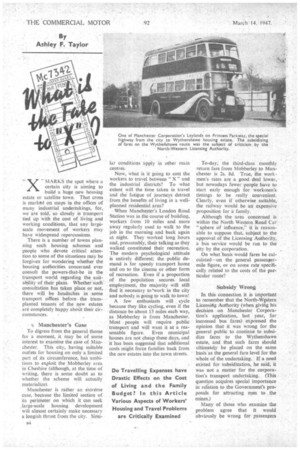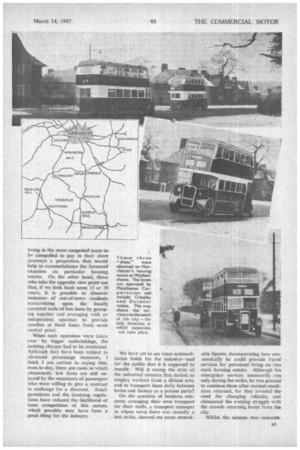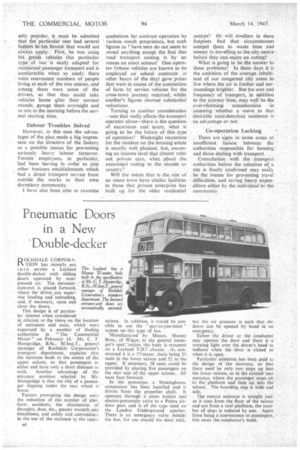" V " MARKS the spot where a certain city is
Page 38

Page 39

Page 40

If you've noticed an error in this article please click here to report it so we can fix it.
aiming to build a huge new housing estate or satellite town. That cross is marked on maps in the offices of many industrial undertakings, for, we are told, so closely is transport tied up with the cost of living and working conditions, that any largescale movement of workers may have widespread repercussions,
There is a number of towns planning such housing schemes and people who devote critical attention to some of the situations may be forgiven for wondering whether the housing authorities concerned eVer consult the powers-that-be in the transport world regarding the suitability of their plans. Whether such consultation has taken place or not, there will be headaches in some transport offices before the transplanted tenants of the new estates are completely happy aboin their circumstances.
4. Manchester's Case To digress from the general theme for a moment, it may be of some interest to examine the case of Manchester. This city, having suitable outlets for housing on only a limited part of its circumference, has ambitions to exploit the Mobberley area in Cheshire (although, at the time of writing, there is some doubt as to whether the scheme will actually materialize).
Manchester is rather an extreMe case, because the limited section of its perimeter on which it can seek large-scale housing development will almost certainly make necessary a longish thrust from the city. Simi
lar conditions apply in other main centres.
Now, what is it going to cost the workers to travel between " X " and the industrial districts? To what extent will the time taken in travel and the fatigue of journeys detract from the benefits of living in a wellplanned residential. area?
When Manchester's London Road Station was in the course of building, workers from 10 miles and more away regularly used to walk to the job in the morning and hack again at night. They worked long hours and, presumably, their talking as they walked constituted their recreation. The modern psychological attitude is entirely different; the public demand is for speedy transport home arid on to the cinema or other form of recreation. Even if a proportion of the population secures local employment, the majority will still find it necessary to 'work in the city and nobody is going to walk to town!
A few enthusiasts will cycle because they like cycling, even if the distance be about 15 miles each way, as Mobberley is from Manchester. Most people will require public transport and will want it at a reasonable figure. Even municipal houses are not cheap these days, and it has been suggested that additional 'costs might force families back from the new estates into the town streets.
To-day, the third-class monthly return fare from Mobberley to Manchester is 2s. 8d. True, the workmen's rates are a good deal lower. but nowadays fewer people have to start early enough for workmen's timings to be really convenient. Clearly, even if otherwise suitable, the railway would be an expensive proposition for a family.
Although the area concerned is within the North Western Road Car "sphere of influence," it is reasonable to suppose that, subject to the approval of the Licensing Authority, a bus service would be run to the city by the .corporation.
On what 'basis would fares be calculated—on the general passengermile figure, or on some rate specifically related to the costs of the particular route?
Subsidy Wrong
In this connection it is important to remember that the North-Nstern Licensing Authority (when giving his decision on Manchester Corporation's application, last year, for increased bus fares) expressed the opinion that it was wrong for the general public to continue to subsidize fares to the Wythenshawe estate, and that such fares should ultimately be placed on the same basis as the general fare level for the whole of the undertaking. If a need existed for subsidization, he said, it was not a matter for the corporation's transport undertaking. (This question acquires special importance in rdation to the Government's proposals for attracting men to the mines.)
Many of those who examine the problem agree that it would obviously be wrong for passengers living in the more congested areas to
compelled to pay in their short journeys a proportion that would help to counterbalance the favoured situation on particular housing estates. On the other hand, those who take the opposite view point out that, if we look back some 15 or 20 years, it is possible to discover instances of out-of-town residents economizing upon the locally accepted scale of bus fares by grouping together and arranging with an independent operator to provide coaches. at fixed times from some central point.
When such operators were taken over by bigger undertakings, the existing charges had to be continued. Although they have been subject to all-round percentage increases, I think I am correct in saying that, even to-day, there are cases in which abnormally low fares are still enjoyed: by the successors of passengers whowere willing to give a contract in exchange for a discount. Amalgamations and the licensing regulations have reduced the likelihood of keen competition of this nature, which possibly may have been a good thing for the industry. We have yet to see what nationalization holds for the industry—and for the public that it is supposed to benefit. Will it cramp the style of the industrial concern that desires to employ workers from. a distant area and to transport them daily between home and factory as a private party?
On the question of business concerns arranging their owntransport for their staffs, a transport manager in whose town. there was recently a bus strike, showed me some remark
able figures, demonstrating how economically he could provide travel services for personnel living on two main housing estates. Although his. emergency services necessarily ran only during the strike, he was pressed to continue them after normal conditions returned, for they avoided the need for changing vehicles, and eliminated the evening struggle with the crowds returning home from the. city.
Whilst the scheme was undoubt
edly popular, it must be admitted that the' particular user had several factors in-his favotir that would not always apply. First, he was using his goods vehicles (his particular type of van is easily adapted for occasional passenger transport and is comfortable when so used): there were convenient numbers of people living at each of the two estates, and among them were some of the drivers, so that they could take vehicles home 4fter their normal rounds, garage them overnight and re,urn in the morning before the normal starting time.
Dabour Troubles Solved However, in this case the advantages of the plan made a big impression on the directors of the factory as a possible means for preventing seriously heavy labour turnover. Female employees, in particular, had been leaving in order to join other business establishments which had a direct transport service from outside the works to their own dormitory community.
I have also been able to examine quotations for contract operation by various coach proprietors, but such figures as 7. have seen du not seem to reveal anything except the fact that road transport costing is by no means an exact science! One operator (whose vehicles are known to be employed on school contracts at other hours of the day) gave prices that were in excess of the summatiou of fares by service vehicles for the cross-town journey required, whilst another' s figures showed substantial reductions.
Turning to another consideration —one that really affects the -transport operator alone—there is the question of excursions and tours; what is going to be the future of this type of operation? Weeknight recreation for the resident on the housing estate is usually well planned, but, assuming an income level that almost rules out private cars, what about the occasional outing to the seaside or country?
Will the estate that is the size of no mean town have similar facilities to those that private enterprise has built up for the older residential centres? Or will dwellers in these outposts find that circumstances compel them to waste time and money in travelling to the city centre before they can enjoy an outing?
What is going to be the answer to these problems? In these days it is the ambition of the average inhabitant of our congested city areas to live where the air is fresher and surroundings brighter. But the cost and frequency of transport, in addition to the journey time, may well be the overwhelming consideration in assessing whether a move to that desirable semi-detached residence is an advantage or not.
Co-operation Lacking There are signs in some areas ot insufficient liaison between the authorities responsible for housing and those dealing with transport. Consultation with the transport authorities before the selection of a site is finally confirmed may easily be the means for preventing travel difficulties, and saving heavy expenditure either by the individual 'or the community.




















































































